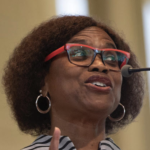
Harris stands on shoulders of giants.
The struggle to get president-elect Joe Biden to the finish line was unquestionably epic.
However, Joe’s wasn’t a century-long battle, like the one in which women finally won the right to vote in 1920 with the 19th Amendment, their efforts in hopes a female would one day be elected to one the highest offices in government.
The fact that Vice President-elect Kamala Harris broke through the 18 million cracks in the glass ceiling in 2020 is extremely exciting. The news has had my sister-friends verklempt and struggling to contain tears as we shout, “Mamala in the house!” and, “Madame Vice President” while drinking too much Jamaican rum punch and dancing (socially distanced) to the reggae sounds of Jimmy Cliff and Bob Marley, honoring the Jamaican part of Harris’s heritage.
At the same time, Harris’ ascension to the vice presidency, sadly, shows just how underrepresented many demographics are in US politics, as she represents a number of firsts: woman, Black, Indian American, child of immigrants, HBCU graduate. If there are more, forgive me.
In 1984, Queens Rep. Geraldine Ferraro was named Water Mondale’s running mate on that year’s Democratic presidential ticket, making it the first time a woman was nominated by a major national party for a top spot. The daughter of Italian immigrants, Ferraro, like Harris, represented many firsts: woman, Italian American, and feminist. “We’ve come too far on the path to equality, we can’t let them turn us around now,” Ferraro famously said during the race. Reflecting on the Harris win and her own mother’s struggles with blatant sexism during her run for the VP position, Donna Zaccaro, Ferraro’s daughter, told NY1: “I do see it as a continuation of my mother’s legacy. Even though in that campaign she lost, and in a landslide … how she conducted herself during that campaign proved that a woman could be VP of the US. Or even president.”
Twenty-four years would elapse before the next woman was nominated to run as a vice-presidential candidate, former Alaska Gov. Sarah Palin in 2008. Palin ran on the Republican ticket with then-presidential hopeful Arizona Sen. John McCain. Palin was the first Republican nominee and second female, and the Republican seemed elated to see a woman finally win, with Palin writing in an Instagram post: “Congrats to the democrat V.P. pick. Climb upon Geraldine Ferraro’s and my shoulders, and from the most amazing view in your life consider lessons we learned… and ‘don’t forget the women who came before you.’”
Long before Harris, the woman who paved the way for women and other underrepresented demographic groups in US politics was Congresswoman Shirley Chisholm. I grew up knowing Chisholm; we kids called her Mrs. C. when she represented my Brooklyn Congressional District for seven terms from 1969 through 1983. She was known throughout the neighborhood and the halls of power in New York as a force to be reckoned; as reflected in the title of her 1970 memoir, she was “unbought” and “unbossed.”
In 1972, Chisholm became the first female and person of color to run for president, paving the way for others. In her 1973 book, The Good Fight, she explained: “I ran for the presidency, despite hopeless odds, to demonstrate the sheer will and refusal to accept the status quo. … The next time a woman runs, or a black, or a Jew or anyone from a group that the country is ‘not ready’ to elect to its highest office, I believe that he or she will be taken seriously from the start. … I ran because somebody had to do it first.”
Black women have paved the way for women and other underrepresented demographic groups in US politics. As a voting bloc, we are the DNC’s strength, and we know the paths we’ve paved for others. We take pride in our agency and voter-mobilization strategies that have helped candidates like Barack Obama and now a Biden-Harris team cross the finish line. We celebrate these achievements.
Rev. Irene Monroe can be heard on the podcast and standing Boston Public Radio segment ALL REV’D UP on WGBH (89.7 FM). Monroe’s syndicated religion columns appear and the Boston voice for Detour’s African American Heritage Trail. She is a s a Visiting Researcher in the Religion and Conflict Transformation Program at Boston University School of Theology.

